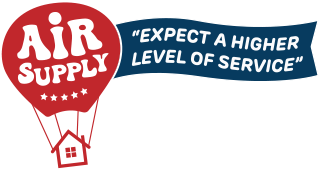When we think about air conditioning, we often focus on temperature control. However, there’s another essential factor to consider, humidity. The level of humidity inside and outside your home can greatly impact the efficiency as well as the effectiveness of your air conditioner. Air Supply Heating & Air Conditioning would like to share how humidity affects your air conditioner’s performance and provide some tips on how to manage humidity more effectively.
Humidity & Your Air Conditioner
Humidity refers to the amount of moisture or water vapor in the air. Summer rains often come with very high humidity levels. When humidity levels are high, the air feels warmer than the actual temperature. The temperatures feel warmer due to the reduced rate of evaporation of sweat from your body. When humidity levels are low, the air may feel cooler than the actual temperature. Your home’s air conditioning system cools your home by removing heat and moisture from the air. When the humidity is high, your air conditioner has to work harder to remove excess moisture and bring down the temperature, which can put a strain on the system and decrease its efficiency.
Impacts of High Humidity on AC Efficiency
High humidity levels can affect your air conditioner’s performance in many different ways, such as:
• Less Comfort: High humidity can make your home feel stuffy and uncomfortable, even if your thermostat is set to a cool temperature. This might cause you to lower the thermostat even more, making your air conditioner work even harder.
• Increased Energy Usage: If your air conditioner is continually running to combat high humidity, it will consume a lot more energy, resulting in a much higher utility bill.
• Increased Wear and Tear: The more your air conditioner runs, the more wear and tear it experiences. This constant operation can lead to more frequent breakdowns and shorter lifespan of the unit.
• Poor Indoor Air Quality: High humidity can create an ideal environment for mold and mildew growth, which can contribute to poor indoor air quality.
Tips to Manage Humidity in Your Home
Luckily, there are ways to help manage humidity in your home to ensure your air conditioner works efficiently. Here are some of the best ways to manage humidity:
• Use a Dehumidifier: A dehumidifier can help remove excess moisture from the air, reduce the load on your air conditioner and make your home more comfortable.
• Humidity-Controlling Thermostat: Some modern thermostats can monitor indoor humidity levels in addition to temperature. They can be set to turn your air conditioner on if humidity levels get too high, even if the temperature is at a comfortable level.
• Regular Maintenance: Regular maintenance of your air conditioner ensures it runs at its peak efficiency. A maintained unit can better handle high humidity levels and cool your home more effectively.
• Whole-Home Dehumidifier: If humidity is a constant issue in your home, you might want to consider installing a whole-home dehumidifier that works along with your air conditioning system to effectively remove excess moisture from the air.
• Improve Home Ventilation: Good ventilation can help control humidity levels. Use exhaust fans in areas prone to high humidity, like your kitchen and bathroom.
Central Air Conditioning Diagnosis, Repair, Replacement, Maintenance & More in Summerlin, North LV, Henderson, Centennial, Enterprise, Lone Mountain Village, Paradise, Sunrise Manor, Spring Valley, Aliante, Desert Shores, Eldorado, Peccole Ranch, Silverado Ranch, Tuscany Village, Whitney, Winchester & Las Vegas Nevada
While humidity can impact your air conditioner’s performance, understanding its effects and then developing a plan to control it can ensure your air conditioner works efficiently. For HVAC services, contact Air Supply Heating & Air Conditioning today.

